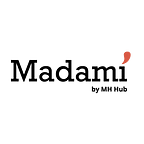Language is Power: Why We Developed a Glossary for the Menstrual Movement
A 2016 study by The International Women’s Health Coalition and Clue conducted a survey that found people worldwide use more than 5,000 euphemisms for their periods. If such a long history of stigma weighs on the word ‘menstruation’ alone, what does that mean for the other terms associated with menstrual health across the lifecycle?
Language helps form the beliefs and attitudes that surround our experiences.
Language can affect how people who menstruate — and those who do not — feel about and understand periods. The efforts to break menstrual taboos and enhance menstrual wellbeing should be available to all, without the barriers of confusing or advanced language around menstruation. Inaccessible language can create barriers to advancing the menstrual movement by being intimidating or regressive.
This is why Madami and PERIOD. took on the challenge of curating, centralizing, and creating a holistic document that celebrates the diversity of terms to describe menstrual experiences and the multitude of different strands of education, activism, and advocacy within the menstrual movement.
This Glossary for the Global Menstrual Movement will help catalyze greater advocacy and inclusion of the diverse experiences within the global menstrual community, inclusive of young people, indigenous populations, people of color, people living with disabilities, and other historically marginalized populations who are often not included in the conversation.
With the menstrual movement growing in strength each day and the topic of menstruation finally being recognized as a priority in the fight towards equity and equality, we need a shared understanding of our field and alignment on baseline terminologies.
We also developed this Glossary because we recognize that for many who work in the menstrual health space, the menstrual cycle is not simply about bleeding or menstrual health management but rather about the experiences of navigating life while bleeding.
This duality should be reflected in terms and descriptions that speak to both the biological and social experiences of menstruation. Menstrual health is ultimately a gendered and sexed experience that individuals navigate daily. It is important to recognize that not all those who menstruate identify with womanhood, and not all women menstruate. Language should aim to be inclusive and appropriate to all the contexts in which one works. At times, that means using gender-neutral language such as ‘menstruator,’ and sometimes the most appropriate inclusive language is ‘women, girls and those who menstruate.’ The language people choose to use should be suitable for their own context and community.
Without appropriate or uniform language, communications and advocacy can fail to connect our efforts effectively to those we aim to influence, namely policymakers, corporations, activists, donors, and other changemakers.
Ultimately, without unified language, we will see even more barriers to realizing our goals of ensuring healthy, dignified, and affordable periods for all. (Hampton and Osbourne, 2020; Hennegan et. al., 2017)
Presently, this Glossary is only available in English. We hope this is the first version of several, in multiple languages, to better reflect the experiences that vary from region to region and the people and organizations who work in this movement throughout the world. Similarly, we recognize that this Glossary is not exhaustive and hope that future editions will continue to support menstrual health advocates and professionals to familiarize themselves with the terminology of the menstrual movement.
We all know that language is ever-changing and constantly growing, and we welcome feedback and recommendations for enhancements. We are excited for the future of advancing menstrual health and equity. When we all have access to the language of the movement, it can only grow in power and grow in strength.
Download the Glossary: mhhub.org/glossary
Screenshot your favorite word. Post on social and tell us why!
Accounts to tag:
- Instagram: @periodmovement, @menstrualhealthhub, @madami_co
- Twitter: @periodmovement, @madami_co
- LinkedIn: PERIOD. Madami
- Facebook: PERIOD. Inc., Menstrual Health Hub
Hashtags to Use:
#periodglossary #menstrualmovement #menstrualhealth #menstruationmatters #menstrualequity
References:
- Hampton, Janie and Osborne, Althea. (2020) Menstrual Health Language Study, 2020. Created for the Global Menstrual Collective and funded by Water Supply & Sanitation Collaborative Council (WSSCC).
- Hennegan, Julie; Torondel, Belen; Phillips-Howard, Penelope; Sommer, Marni and Montgomery, Paul (2017) Time to talk about menstruation: a response. Lancet, Vol 390, Issue 10097, pp. 845–846.
